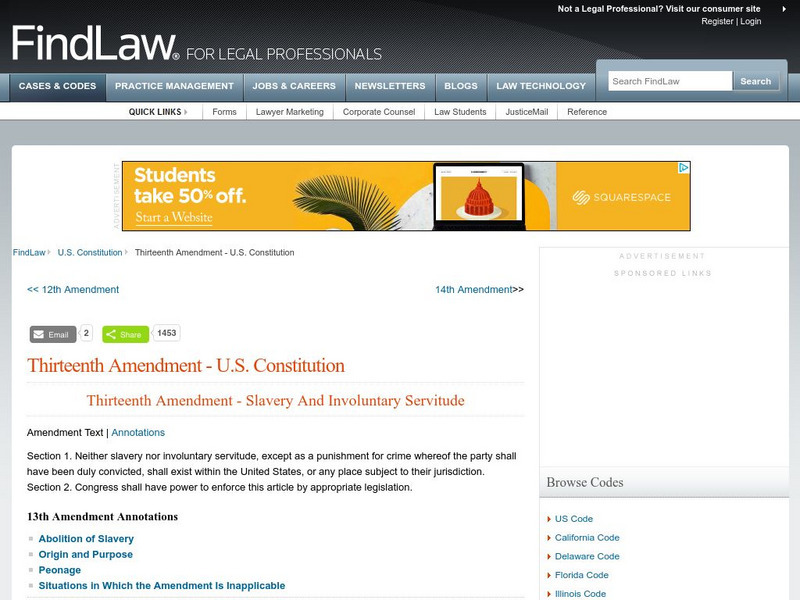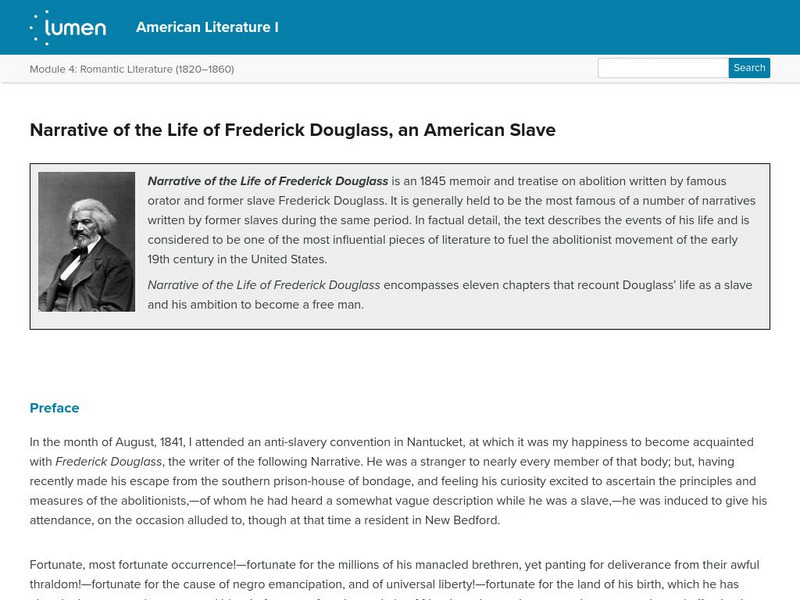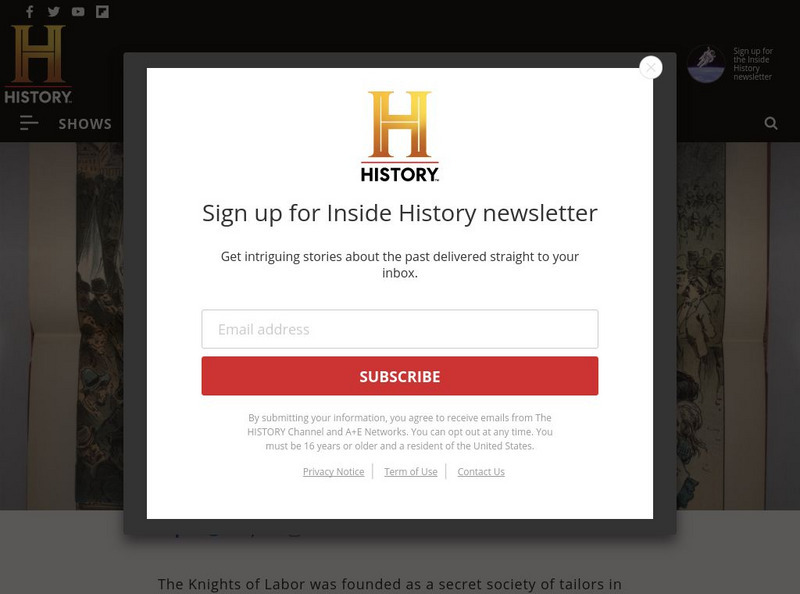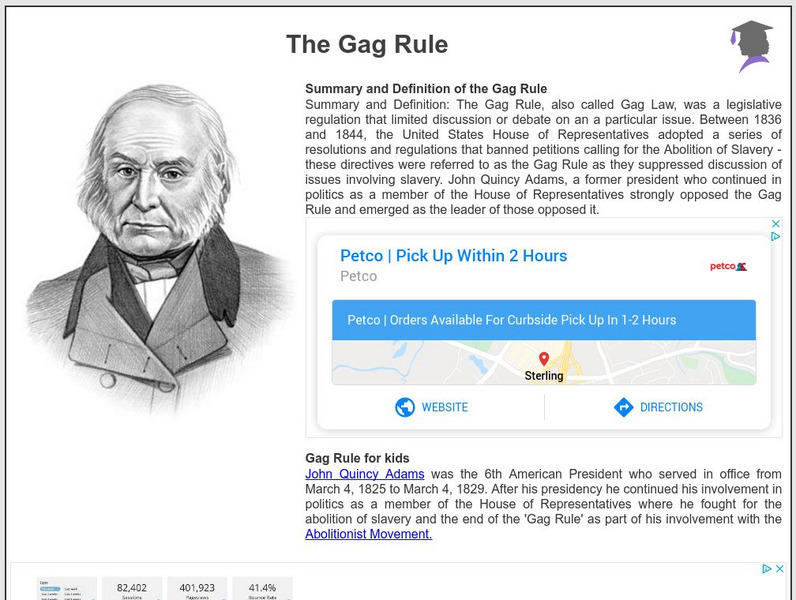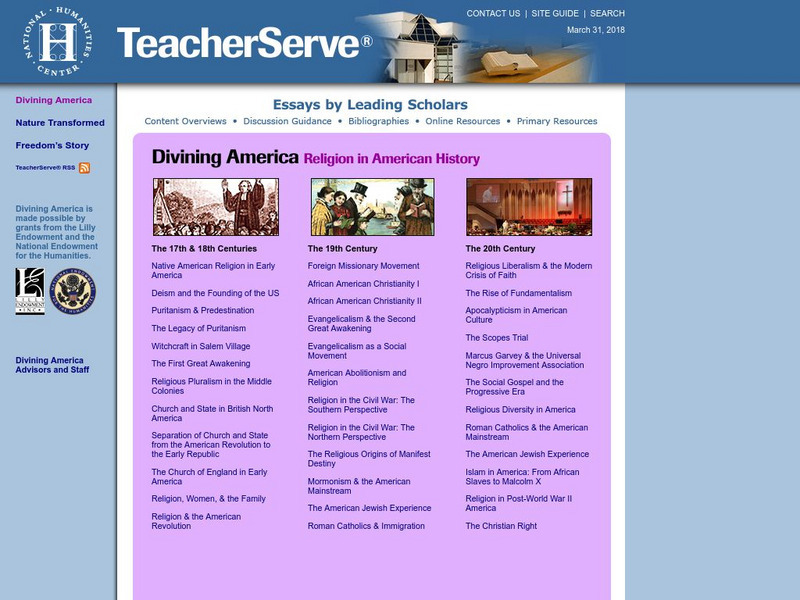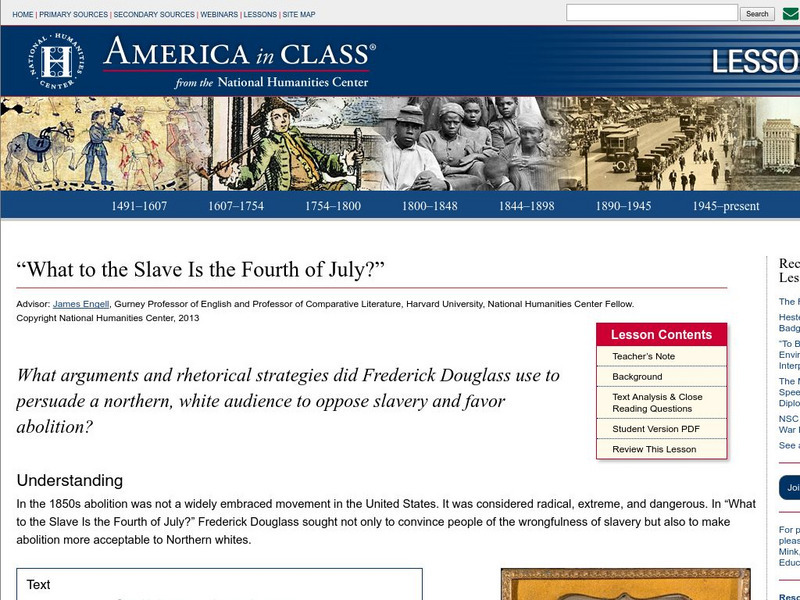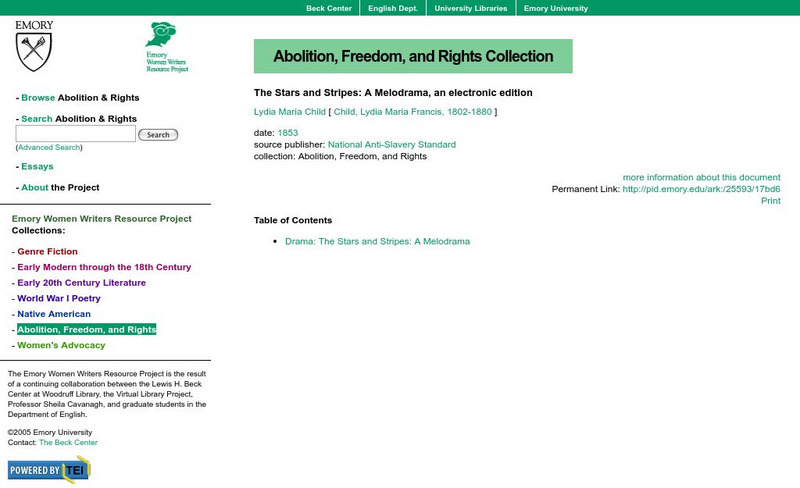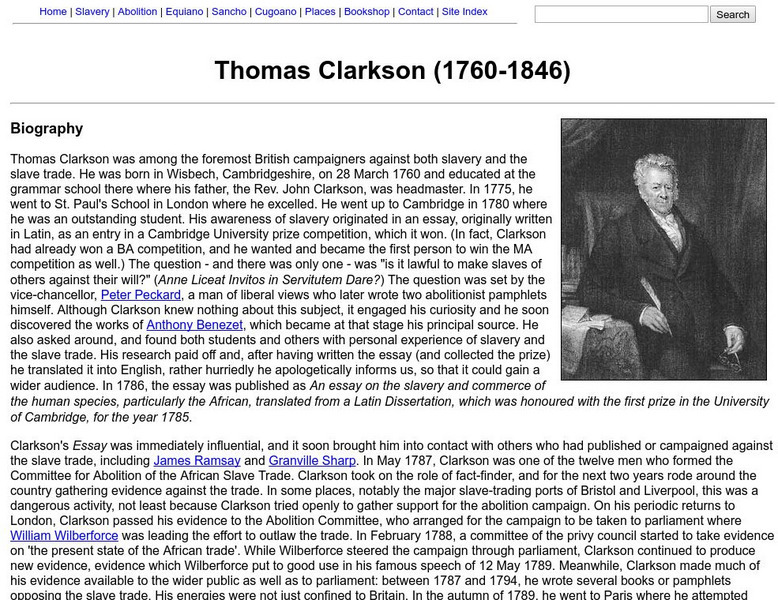Thomson Reuters
Find Law: u.s. Constitution: Thirteenth Amendment
This source provides the Thirteenth Amendment as it is worded in the U.S. Constitution. At the bottom of the page are annotations with links to information about the abolition of slavery, origin and purpose of the amendment, peonage, and...
Lumen Learning
Lumen: Narrative of the Life of Frederick Douglass, an American Slave
This is the text and audio of the autobiography Narrative of the Life of Frederick Douglass, an American Slave by Frederick Douglass. This 1845 memoir and treatise on abolition encompasses eleven chapters that recount Douglass' life as a...
A&E Television
History.com: Knights of Labor
An article regarding the Knights of Labor and their struggle for the eight-hour day, abolition of child labor, equal pay for equal work, and political reforms including the graduated income tax.
Other
Online Archive of 19th Century u.s. Women's Writings: Emancipated Slaveholders
Writing in the 1840s, Lydia M. Child tells the story of ex-slavers living in Virginia. Demonstrates the complexity of the abolition debate in Pre-Civil War America.
Other
In Search of Heroes: The Susan B. Anthony Story
Read highlights on the life of Susan Brownwell Anthony covering information on her role in the abolition, temperance, and suffrage movements.
Columbia University
Columbia University: Columbia University & Slavery 7. Columbia Faculty
This website was created by faculty, students, and staff to publicly present information about Columbia's historical connections to the institution of slavery. This article discusses the connection between Columbia's faculty to slavery....
British Library
British Library: Discovering Literature: African Writers and Black Thought in 18th Century Britain
This article describes how four writers, taken from Africa as children and sold into slavery, grew up to write works that challenged British ideas about race, called for African brotherhood, and demanded the abolition of the slave trade.
Annenberg Foundation
Annenberg Learner: The Events of 1831: Interactive Timeline
This interactive timeline helps you examine how some of the events of 1831 were related. Significant events include slavery, abolition, evangelical revivalism, and new inventions.
Siteseen
Siteseen: American Historama: The Gag Rule
Details concerning the Gag Rule that limited discussion or debate on a particular issue and banned petitions calling for the abolition of slavery.
The History Cat
The History Cat: The Abolitionists
Describes the abolitionist movement and the people who pushed for the abolition of slavery, especially William Lloyd Garrison who founded the Liberator newspaper and the New England Anti-Slavery Society. Arguments for slavery were put...
Curated OER
Anti Slavery Banner for the Promotion of the Immediate Abolition of Slavery
A five-part article describing the British antislave trade movement. All major figures in the abolition movement discussed.
Texas State Library and Archives Commission
Texas State Library and Archives Commission: Beginnings of the Movement: Abolition and Early Women's Rights Movement
How was the anti-slavery movement tightly connected with women's right to vote? Explore the efforts of women abolitionists, who realized that "the injustice they wanted to remedy for blacks also applied to women." Primary texts at this...
Curated OER
Abolition Celebration in Washington, d.c.
This site provides several maps which depict the slave states and the free states. There are links that will connect you with an abolitionist song and information on John Brown.
Khan Academy
Khan Academy: Us History: 1844 1877: Failure of Reconstruction
The abolition movement sought to end the practice of slavery in the United States.
National Humanities Center
National Humanities Center: Teacher Serve: Divining America: Religion in American History
A collection of scholarly essays consisting of instructional guides accompanied by commentary. Designed to help teachers of American history bring students to a greater understanding of the role religion has played in the development of...
Yale University
Avalon Project: Modern Customs and Ancient Laws of Russia
A lecture by Maxime Kovalevsky discusses the origin, growth, and abolition of serfdom in Russia. It describes the important facts of Russian serfdom, the history and growth of the institution, and the peasant-landlord relationship.
National Humanities Center
National Humanities Center: America in Class: "What to the Slave Is the Fourth of July?"
Explores the argument made by Frederick Douglass and his appeals to convince northern whites to oppose slavery and favor abolition. Lesson content includes resources for both teachers and students.
OpenStax
Open Stax: Women's Rights
From a chapter on " Antebellum Idealism and Reform Impulses," this section explains the connections between abolition, reform, and antebellum feminism and also describes the ways antebellum women's movements were both traditional and...
Stanford University
Beyond the Bubble: Slave Quarters
[Free Registration/Login Required] Students examine a photograph of former slave quarters in Georgia and answer questions about the living conditions of slaves. They will also observe how the fact that the photograph was taken decades...
Smithsonian Institution
Smithsonian Learning Lab: Powerful Symbols and Words: Abolitionism & Women's Rights
This collection looks at an image and phrase used widely in abolitionist materials, and at how that symbol was adopted and adapted by Sojourner Truth and/or other women's rights activists. Students will examine an abolitionist medallion...
National Women’s History Museum
National Women's History Museum: Sarah Moore Grimke
Learn about Sarah Grimke who with her sister fought for abolition and women's rights.
National Women’s History Museum
National Women's History Museum: Sojourner Truth
Learn more about Sojourner Truth, the outspoken advocate for abolition, temperance, and civil and women's rights.
Emory University
Lewis H. Beck Center: Child, Lydia: The Stars and Stripes: A Melodrama
Read Lydia Maria Child's "The Stars and Stripes: A Melodrama." This play, originally published in the National Antislavery Standard (1853), served as propaganda for the abolitionist movement.
Other
Personal Site: Thomas Clarkson
A nicely done biography of the famous British anti-slavery campaigner in the 18th and 19th centuries.
Other popular searches
- Abolition Movement
- Abolitionists
- Abolition of Slavery
- Abolitionist Movement
- Abolition Slogans
- Abolition and Suffrage
- Abolition and Women's Rights
- Abolition Debate
- Slaves and Abolition
- Abolition of Slavery Laws
- Abolition in America
- Abolition Crusade


